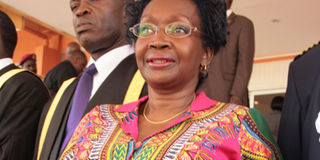Budget: Government plots tough tax measures

Minister Maria Kiwanuka at last year’s budget reading.
What you need to know:
About 30 per cent of all rural people, some 10 million men, women and children, still live below the national rural poverty line.
LONDON
In a plan which treads a fine line between generating more revenue to plug a growing fiscal deficit and kicking new life into Uganda’s struggling economy, the government months ago proposed a raft of new taxes, some of which could be drafted into the 2012/13 budget due for reading today.
A May 18 report published by the International offers some insights into how the measures, including a proposal to reinstate the controversial tax on water, could be initiated as part of an ambitious plan to raise in excess of an additional Shs130 billion every year from local sources.
The VAT on water, a basic commodity, was scrapped last financial year by Parliament. MPs said there was need to make safe water affordable to all as a way of fast-tracking water supply and sanitation.
Commenting on the report which is part of the IMF’s Fourth Review under the Policy Support Instrument and Request for Modification of Assessment Criteria, former shadow finance minister Oduman Okello said government wants to balance its books on the back of the poor.
The IMF report refers to high profile discussions on the proposed tax measures held in Kampala between March 7-21 at a meeting of officials from the Fund and Finance Minister Maria Kiwanuka, Bank of Uganda Governor Tumusiime-Mutebile, Secretary to the Treasury Chris Kassami, and other senior officials.
“Who created the deficit? Government abused public funds and Ugandans are now paying the price. They bought jets at Shs1.7 trillion without approval of Parliament and now they want to increase taxes,” Mr Oduman said.
Players in the textile sector could find themselves operating in a new environment if the government goes ahead with its proposal to remove all the VAT exemptions previously enjoyed by the sub-sector in a bid to raise an estimated Shs15 billion. Similar levies could also be extended to computers even though under the current tax regime, electronics like computers were tax exempt in line with the stated policy to promote ICT in the country.
Under the proposed excise tax, the IMF report says, Finance Minister Maria Kiwanuka has considered raising duties on locally produced spirits from 45 per cent to 60 per cent to raise Shs3b. Government also contemplated a change in excise tax for cigarettes from specific to ad valorem at 130 per cent to raise Shs20b and impose excise duty on imported fresh juices.
On income tax, the government reportedly thought about terminating exemptions on agro-processing business income and instead imposing an additional 10 per cent marginal rate for the top bracket of personal income tax. The plan further considers tightening the scope of exemption on plant and machinery and civil works to generate Shs5b.
Other increments were also considered on withholding tax for interest and dividends. The IMF report says this will be achieved by revising the tax rate from 15 to 20 per cent. There is also a plan to enforce existing capital gains tax on sale of commercial buildings, a move the government says will generate more than Shs1 billion annually.
The IMF says the government agreed to include revenue enhancements in the draft 2012/13 Finance Bill. The tax measures would yield about ¼ per cent of GDP of additional revenue—achieved mostly from suspension of some VAT and corporate income tax exemptions and tax holidays. “[IMF] staff supported the implementation of these revenue measures, but saw them only as necessary towards reforming the extensive tax exemptions that contribute to poor revenue performance,” the report reads in part.
Ms Kiwanuka said the tax system in its present form was not delivering enough revenue to fund planned infrastructure development, and accepted there would be benefits from streamlining exemptions. She reportedly said if implemented the tax measures would generate about Shs130b annually.
While it’s not yet clear if the new tax measures will all be part of the 2012/13 Budget, in the latter regard, the IMF says government intends to carry out another systemic review of tax procedures this year to identify additional areas for tax yields and will submit a draft tax procedure code to Cabinet by April 1, 2013 and to Parliament in June next year.
With the focus on Karuma power project—and by a more accelerated development in the country’s oil sector - in the 2012/13 Budget, government has set an ambitious target for URA to collect over Shs6 trillion. The government is looking to generate a substantial portion of the proposed more than Shs10.2 trillion budget from domestic sources.



